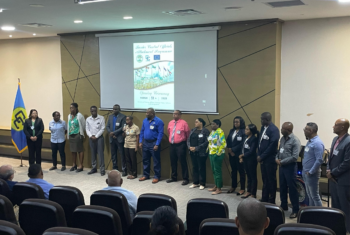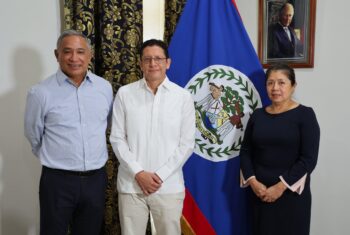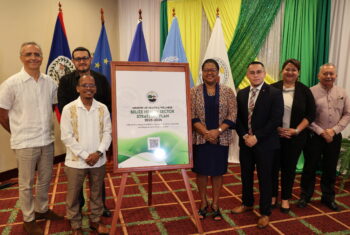Belmopan. September 6, 2022. 10:30 a.m.
On September 2, 2022, Hon. Christopher Coye, Minister of State in the Ministry of Finance, Economic Development, and Investment, made a presentation at a roundtable on climate finance with an emphasis on the energy transition in Latin America and the Caribbean at the UN Economic Commission for Latin America and the Caribbean (ECLAC) Regional Forum on Climate Initiatives to Finance Climate Action and the Sustainable Development Goals. Minister Coye participated virtually at the event, which was held in Santiago, Chile.
In his presentation, Minister Coye spoke about the challenges that a small vulnerable country facing compounding risks and cumulative impacts from past, present and anticipated global threats must constantly account for whether planning for progress or making contingency plans for the risks faced.
The minister used Belize’s Blue Bond experience to highlight the critical need for partnerships with organizations such as The Nature Conservancy and the US Development Finance Corporation. He also emphasized that “critical for this partnership coming together was Belize’s globally recognized commitment to protecting the environment as well as our government’s commitment to put our financial house in order with a demonstrated adherence to its homegrown fiscal and economic plan. Belize’s unwavering commitment to its homegrown plan, which included difficult fiscal consolidation measures in the immediate term such as public wage and other expenditure cuts, gave credibility to our intentions and plans, which was acknowledged and endorsed by the IMF, and which in turn grounded our negotiating position with our commercial bondholder counterparts. This was crucial to the successful negotiation of the transaction.”
In regards to the upcoming COP 27, Minister Coye emphasized four outcomes on climate finance that Belize wishes to see addressed:
- Climate finance must match the needs of developing countries:
The deficit is not in the billions; it is in the trillions.
- Concessional finance:
High level concessional finance is a must, especially grant funding. During the period of 2015-19, 52% of Belize’s climate investments came from loans while the government contributed 9% as counterpart financing. Only 36% were grants. A significant change is needed in this balance with higher concessional funding
- Simplified access:
The complicated processes of project development and approval have created a significant time-gap between identifying the climate finance requirement and getting funds in the bank to start project implementation. Due to well-known incremental costs in climate finance, this may potentially widen the gap of funding requirements. Therefore, simplified processes are important to significantly narrowing these time gaps.
- Loss and damage financing:
The currently available mechanisms have ignored the losses and damages triggered by climate change. In reality, countries are struggling to manage these impacts on the ground. The social, environmental and economic losses due to climate change impacts are enormous. With the increasing frequency of storms, hurricanes and droughts, the situation can be worse. It can affect the level of ambition and the country’s capacity to address climate change challenges. Therefore, the investments on climate change mitigation and resilience building must be harmonized with adequate investments towards handling losses and damages due to slow and rapid on-set extreme climate events.
Ends



